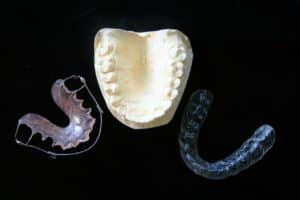How to Avoid Bruxism & Ease Jaw Pain
 Using A Night Guard to Reduce Jaw Pain & Discomfort
Using A Night Guard to Reduce Jaw Pain & Discomfort
Waking with a headache or a sore jaw isn’t the ideal way to start the day. But for the 10 to 15 percent of us who suffer from bruxism, the pain and soreness of teeth grinding and jaw clenching can be a daily inconvenience.
But it doesn’t have to be. Although the causes of bruxism are fairly complex, protecting your teeth from wear and reducing discomfort can be as simple as popping in a night guard before you fall asleep. And with your dentist’s help, your mouth guard can have the best fit and highest comfort level possible.
What is Bruxism?
Many people with bruxism aren’t even aware of it – the excessive teeth grinding and jaw clenching associated with the problem don’t exhibit symptoms in all sufferers. But for those who do experience pain and soreness, bruxism can be a major inconvenience.
Bruxism falls into two categories – sleep and awake bruxism. With the former, symptoms are at their worst upon waking and gradually improve; with the latter, they may not be noticeable on waking, but get worse over the course of the day. Men and women suffer sleep bruxism equally, although women suffer awake bruxism more frequently.
Bruxism is associated with teeth grinding and jaw clenching, and can result in tenderness and inflammation of facial muscles, headaches, inflammation of periodontal ligaments, hypersensitive teeth, and excessive wear, chipping or fractures to teeth.
Causes of Bruxism
According to the Mayo Clinic, the causes of bruxism are not completely understood by doctors.
Several Factors Can Increase Your Risk of Nighttime Teeth Grinding, Including:
- Genetics, or if others in your family have bruxism
- Increased anxiety or stress factors
- As a side effect of some antidepressants
- Tobacco, alcohol or caffeine use
- Sleep-related disorders
- ADHD
- Parkinson’s disease
Bruxism is typically first noticed by a sleep partner, who hears you grinding your teeth in your sleep. Although a diagnosis is usually simple, it’s important to see your family dentist, who can determine of it is a simple case of bruxism, or if some other condition is causing your teeth to grind.
How Night Guards Can Ease Discomfort
In most cases, Merion Village Dental will prescribe you a night guard (also called dental guards, or occlusal splints) to manage the effects of bruxism.
This custom-fit device is typically made of acrylic, and can be of varying degrees of softness or hardness. Your night guard can cover all or some of your teeth, depending on where your teeth grind, and to what severity.
These guards can ease muscle strain by letting your jaws move more easily against each other, and they create a solid barrier between your teeth to prevent wear and other damage caused by teeth grinding.
Getting Fitted for a Night Guard
Getting fitted for your night guard is simple, and only takes one visit to the dentist. When you come in for your appointment, your teeth will be cleaned, and then an impression will be taken to create the custom guard. The night guard will then be ready after a few days.
Learn more about night guards from Merion Village Dental here.
How Merion Village Dental Can Help
Creating your new night guard is simple and fast, and our professionals can gently and effectively walk you through the process. And during your appointment, our team of Columbus Ohio family dentists will also inspect any potential wear or damage caused by your teeth grinding, and recommend any restoration work that may be needed.
To schedule your next appointment, contact us online or call at 614-443-4400.
Related Posts:
Recent Posts
- When to Call an Emergency Dentist
- Pi(e) Day Perfection: Balancing Sweet Treats with Healthy Teeth
- The Myths And Facts Of Getting A Straighter Smile
- How To Manage Teeth Sensitivity In A Hot Drink Season
- Maximizing Your Dental Insurance Benefits Before New Year’s
Archives
- April 2024
- March 2024
- February 2024
- December 2023
- September 2023
- July 2023
- January 2023
- November 2022
- October 2022
- September 2022
- August 2022
- May 2021
- March 2021
- February 2021
- January 2021
- October 2020
- May 2020
- November 2017
- October 2017
- August 2017
- July 2017
- June 2017
- May 2017
- March 2017
- February 2017
- January 2017
- December 2016
- November 2016
- October 2016
- September 2016
- July 2016
- June 2016
- May 2016
- March 2016
- February 2016
- December 2015
- November 2015
- October 2015
- September 2015
- August 2015
- June 2015
- May 2015
- April 2014
- March 2014
- January 2014
